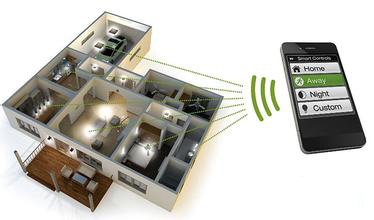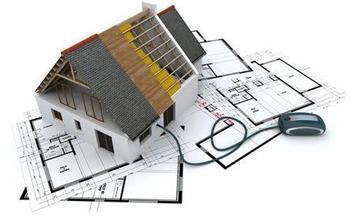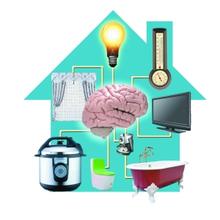Internet of Things, cloud computing, intelligent terminals... Each technology update drives the development of smart life. As a typical application of these technologies, smart homes are presented as smart homes.
With the continuous development of the smart home industry, the speed and extent of the popularization of smart homes are accelerating and expanding, and the acceptance of people is constantly improving with the development of information technology. At a time when market demand has changed, many home appliance companies, IT companies, and security companies have transformed themselves into this emerging market, launching a series of smart home products, further accelerating the market penetration speed. But behind the blossoms, there are many problems that need to be solved, and the industry's ecological environment needs to be improved.

Policy background
The market for smart homes will be blue and the outlook is immeasurable. However, looking at the development process of smart homes entering China for more than ten years, it is not difficult to find that it is still a new market, and various problems restrict the development of the market to some extent. How to break through the existing bottlenecks in the industry, where the future development of smart homes is a common concern in the industry.
opportunity
The "Twelfth Five-Year Plan" period is the stage of China's Internet of Things from the initial development to the scale development. As a typical application of the Internet of Things, smart homes are also opportunities and challenges. The international competition is increasingly fierce. The United States, the European Union, Japan, South Korea, etc. all attach great importance to the development of the Internet of Things industry from the state; the technology development is strongly driven, and the Internet of Things technology is the key development direction in the field of information technology in China. The development of technology promotes all walks of life. Application, constantly leading the development of smart home industry; the expansion of consumer demand continues to develop; the industry development environment is optimized, the national high-level attaches importance to the application development of Internet of Things technology, and has successively promulgated policy measures, clearly pointing out that it is necessary to accelerate the development of IoT technology and application demonstration, With the successive introduction of national and local industrial support policies, the development of the overall smart home industry will continue to be optimized.
challenge
1. Industry: Lack of standardized and unified industry standards
China's smart home industry started late compared with developed countries. After many years of developed smart home industry standards in many developed countries, China still failed to introduce smart home related industry standards, which directly affected the smart home market, resulting in many unwillingness in the market. Compatible product standards bring harm to the healthy development of consumers, manufacturers and industries. The introduction of industry standards is the shared vision of all manufacturers.
Market: related industries can not effectively integrate the development of smart home industry, not only automatic control technology, but also related to the development of security industry, home appliances, IT, system integration, etc. Only the relevant industries can be integrated and play their respective advantages to create smart home. The ecosystem of healthy development of the industry has taken the lead.
2. Technology: Technology development is far from mature
Smart homes have been developing in China for ten years. However, at present, smart home enterprises produce some basic products such as security, voice control, and light control. They rarely have integrated systems and integrated products, which leads to market simplification. The convergence is obvious, the operation of the home is not humanized, and the problems of inconvenient system upgrade are also obstacles to the technological development of smart home.

3, products: cottage products flood the market
Some low-tech, low-quality cottage products flood the smart home market in China, disrupting consumer judgment and purchasing power, and the whole market is very chaotic.
4. Consumption: the price exceeds the affordability of ordinary families
The smart home as a whole is in the primary development stage, and more often it appears in high-end residential areas and houses, which cannot be afforded by ordinary families. Even if it can withstand, the hardware facilities in the residential area do not match and cannot be installed.
How to develop
Based on the above problems, in order to seize the opportunity of triple play, smart home related enterprises should strengthen innovation in product technology research and development. Win the market with high quality products and services.
1. Improve product quality and performance
The operation of smart home products in the future should be simple and clear, and it should be developed in the direction of “fool-likeâ€, and the fun of operation should be improved. Smart homes should also consider the issue of environmental protection and energy conservation, adding energy-saving equipment to the operating system, and intelligently managing power consumption.
2, to ensure the personalization of the operating system
The demand of modern consumers is becoming more and more personalized. The personalization of appearance, the personalization of operating systems and the individualization of product portfolio are the trends of mass consumption. How to meet the needs of different users is a problem that smart home manufacturers should continue to think about. Simple but not lost, it is king.
3, take the people's market route
Close to the people is not only the price reduction, but also pay attention to the follow-up supporting services, installation, operation, maintenance, upgrades and other services. Home furnishing companies must understand the meaning of the people, and must seamlessly connect from product to service.

4, vigorously develop intelligent modules
The intelligent module is the execution unit and control end of the smart home platform, and it is an organic whole with the intelligent central control system. Various intelligent modules are connected to the intelligent central controller through wired or wireless mode, receive the centralized control commands of the central controller, and together with the central controller constitute the wireless smart home products of the entire smart home system platform.
5, wireless products have more market space
Although wireless technology still has a series of problems, such as: how to make the transmission distance as far as possible, while avoiding damage to people as much as possible, how to avoid signal interference, how to increase the transmission bandwidth so that it can transmit more. For complex data and more. However, the flexibility, mobility and scalability of wireless transmission make it better able to cater to the needs of smart home users. For example, enterprises can continue to study and overcome the above problems, which will surely win unlimited business opportunities.
China's smart home industry is still in the primary development stage. At present, most of the specialized smart home manufacturers are some security manufacturers, such as access control, intercom, monitoring, anti-theft, three-meter copy, integrated wiring, information appliances and other production enterprises. . Therefore, from the perspective of smart home products, more are security alarms, intercom, lighting control and air conditioning control products, but there are not many products with advanced control functions and humanized functions. But with the rapid advancement of the triple play. Smart homes will be given more humane content. Under the triple play, more non-traditional smart home manufacturers will join the market competition. If the operator is involved, this will be both an opportunity and a challenge for the smart home industry. foreseeable. The competition of enterprises in the future will be more intense, and smart home enterprises must keep up with the trend of digitalization. Strengthen research and development. Continuously launch products that meet market needs.
Every industry's development will encounter many obstacles. The problems encountered by smart homes are normal. However, if you don't pay attention to it, it will not only be the smart home industry, but the development of related industries will be affected. In general, smart homes are still in the initial stage of technology and industrial development, and their development will certainly experience a burst of pains. Fortunately, some leading companies have this awareness and are trying to adapt to the market transformation and development ideas. I believe that the future smart home market will pay more attention to the consumer experience, and gradually embark on the line of people-friendly, products pay more attention to industry uniform standards and perfect supporting services. With the development of information technology and the improvement of consumption concepts and levels, smart homes will move toward more ordinary families.
Integrated Led Lamp,Integrated Led Lights,Integrated Panel Lamp,Integrated Led Ceiling Lights
Changxing Fanya Lighting Co.,Ltd , https://www.fyledlights.com